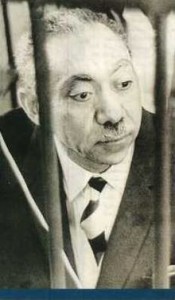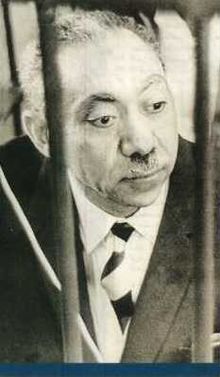
Ever since a friend made me sit down and watch Adam Curtis’ 2004 documentary film series The Power of Nightmares, I’ve been obsessed with the series’ main thesis. In the series, Curtis argues that neo-conservatism and radical Islamism share core values.
The movie follows the ideological development of future Muslim Brotherhood leader Sayyid Qutb as he visits an America gilded by materialism and beset with moral sandtraps like feminism and progressivism. Fearful of the creeping hand of the West in Nasserite Egypt, he develops a movement to reignite the fire of Islamic radicalism in Egyptian politics. Islamism is born.
At the same time, ex-liberals like Irving Kristol turn a growing disenchantment with LBJ’s Great Society into a new kind of conservatism, one obsessed not with individual liberty, but collective liberty centered around a mythical enemy (Islam!) (Liberals!) (Reds!).
The film hinges on comparing the two movements as ideologies rooted in the same ideals: a staunch opposition to liberalism, the existence of a shadowy and existential threat to “our” way of life, and the centrality of society’s moral decay. The film is a re-dux of one of my favorite innovations in political philosophy, the Horseshoe Theory. It says that the ends of the political spectrum sit not farthest apart, but closest together—much like the ends of a horseshoe. The paradigm places moderates farthest from each other and extremists closest together.
Despite my impending status as an absentee voter (I’m currently studying in Istanbul for the semester), I cannot help but stay connected to the endless stream of election rhetoric. From abroad, the classic neo-con war rhetoric gaining steam on the express train to Irans-ville is loud and clear. Since Iran is merely another dark face in the “growing” crowd of Islamic enemies—according to neo-cons—it’s hard not to see the Right’s response to the recent embassy violence as anything more than a re-hashing of their Waiting for the Barbarians siren-sound.
While the killing of ambassadors, protestors and law enforcement is a tragedy, these attacks don’t represent a threat to the American home-front. If ever there was a more external force than an attack on our foreign outposts, it hasn’t come to my attention.
To neo-cons though, these attacks and protests aren’t just a physical threat; the riots represent a challenge to our moral superiority. VP running-boy Paul Ryan called upon America to plot a course of foreign policy based on “moral clarity and firmness of purpose,” adding “only by the confident exercise of American influence are evil and violence overcome.” Leo Strauss to the rescue!
Oddly enough, the sort of behavior that inflames anti-western sentiments in the Middle East is the same sort of behavior to upset the moral (read: religious) vanguard on American soil. One only needs look at the controversy surrounding the Park51 (formerly Cordoba House) development, an interfaith and Muslim prayer center blocks from Ground Zero. The development spawned a range of reactions from the Right, much of them in line with the neo-con notion of an international Muslim conspiracy, raging against the West since time immemorial. Newt Gingrich went deep to pull out this gem: “For example, most of them don’t understand that “Cordoba House” is a deliberately insulting term. It refers to Cordoba, Spain – the capital of Muslim conquerors who symbolized their victory over the Christian Spaniards…”
The moral war against Islam and the Islamist war against the West are eerily similar because they are born of the same impulse: a xenophobic and alarmist call-to-arms against a mythical outside enemy. It is 2012—if we are patting ourselves on the back for not resorting to mob violence against “Shariah law” than we need to take a serious look at American exceptionalism, especially as it relates to our place as a “land of freedom.”
We pride ourselves on the distance between backward anti-western violence and our own place in world politics. If we don’t call out this type of jingoism in our own country, it will start to look a lot more like the theocratic regimes the neo-cons so stridently fear—and resemble.

